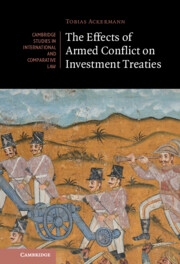Book contents
- The Effects of Armed Conflict on Investment Treaties
- Cambridge Studies in International and Comparative Law: 169
- The Effects of Armed Conflict on Investment Treaties
- Copyright page
- Dedication
- Contents
- Acknowledgements
- Table of Cases
- Table of International Agreements and Documents
- Table of Domestic Instruments and Documents
- Abbreviations
- Introduction
- Part I The Continuity of Investment Treaties
- Part II Investment Protection and the Role of International Humanitarian Law
- Part III Investment Protection Standards during Armed Conflict
- Part IV Exceptions and Defences
- 9 Security Exceptions
- 10 Circumstances Precluding Wrongfulness
- 11 Limitations on Liability
- Summary and Final Conclusions
- Bibliography
- Index
- Cambridge Studies in International and Comparative Law:169
11 - Limitations on Liability
from Part IV - Exceptions and Defences
Published online by Cambridge University Press: 11 August 2022
- The Effects of Armed Conflict on Investment Treaties
- Cambridge Studies in International and Comparative Law: 169
- The Effects of Armed Conflict on Investment Treaties
- Copyright page
- Dedication
- Contents
- Acknowledgements
- Table of Cases
- Table of International Agreements and Documents
- Table of Domestic Instruments and Documents
- Abbreviations
- Introduction
- Part I The Continuity of Investment Treaties
- Part II Investment Protection and the Role of International Humanitarian Law
- Part III Investment Protection Standards during Armed Conflict
- Part IV Exceptions and Defences
- 9 Security Exceptions
- 10 Circumstances Precluding Wrongfulness
- 11 Limitations on Liability
- Summary and Final Conclusions
- Bibliography
- Index
- Cambridge Studies in International and Comparative Law:169
Summary
When host states are liable under investment treaties, they may seek, as a last line of defence, to reduce the extent of liability. Chapter 11 explores arguments respondents may put forward to this end. It shows that the wide discretion arbitral tribunals enjoy when awarding damages presents an opportunity for them to be mindful of the circumstances of armed conflict. These conditions may impact the compensation for lost profits or invite reliance on equitable principles. However, the chapter argues, concerns for economies involved in or recovering from armed conflict should guide tribunals only exceptionally. Contributory fault, on the other hand, may lead arbitrators to cap damages substantially if they find unlawful or unreasonable conduct on the claimant’s side. In contrast, states may raise counterclaims on the basis of investor misconduct during armed conflict only rarely. Overall, the chapter shows that the stage of damages is not the most promising avenue for states seeking to escape liability for armed conflict-related conduct. Focus must instead lie on the primary level of treaty drafting and interpretation.
Keywords
- Type
- Chapter
- Information
- The Effects of Armed Conflict on Investment Treaties , pp. 267 - 280Publisher: Cambridge University PressPrint publication year: 2022

